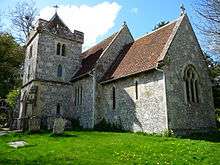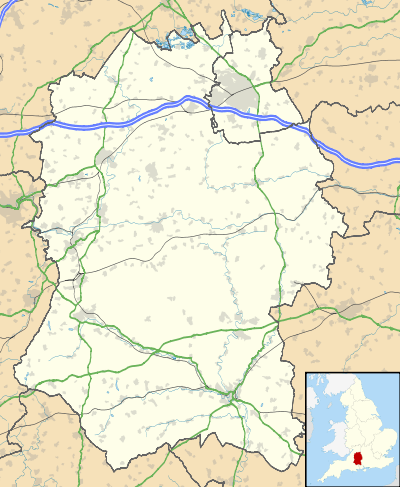St John the Baptist's Church, Allington
St John the Baptist's Church is in the village of Allington, Wiltshire, England. It is a redundant Anglican parish church in the care of the Friends of Friendless Churches.[1] The church is recorded in the National Heritage List for England as a designated Grade II listed building.[2]
| St John the Baptist's Church, Allington | |
|---|---|
 St John the Baptist's Church, Allington, from the southeast | |
 St John the Baptist's Church, Allington Location in Wiltshire | |
| OS grid reference | SU 204 394 |
| Location | Allington, Wiltshire |
| Country | England |
| Denomination | Anglican |
| Website | Friends of Friendless Churches |
| History | |
| Status | Parish church |
| Dedication | Saint John the Baptist |
| Architecture | |
| Functional status | Redundant |
| Heritage designation | Grade II |
| Designated | 10 February 1958 |
| Architect(s) | Fr William Grey |
| Architectural type | Church |
| Style | Norman, Gothic Revival |
| Completed | 1851 |
| Specifications | |
| Materials | Flint and limestone Tiled roofs |
History
The earliest parts of the church date from the 12th century, but only fragments of this remain, namely the chancel arch, and a portion of a Norman door in the north wall. Most of the church was rebuilt between 1847 and 1851, the architect being the "priest-architect" Fr William Grey.[1] The church was declared redundant on 1 February 2010,[3] and was vested in the Friends of Friendless Churches in the following year.[1]
Architecture
Exterior
The church is constructed in flint and limestone with limestone dressings. The roof is tiled. Its plan consists of a nave and a chancel, and a south porch that rises into a tower. The tower is in two stages with angle buttresses and a pyramidal tiled roof. In the upper stage are two-light bell openings, and at the summit is a crenellated parapet with gargoyles. The nave has doors on the north and south sides, the north door containing the Norman fragments. Along the sides of the nave are two- and three-light square-headed windows. In the chancel are two re-set lancet windows dating from the late 12th or early 13th century, and a three-light east window.[2]
Interior
Inside the church, the wall of the nave is rendered and colour-washed; it has a 19th-century wagon roof.[2] The interior of the chancel has stencil and freehand decoration executed in 1876 by Heaton, Butler and Bayne. This is in memory of Revd Fulwar William Fowle, rector of the church for over 60 years.[1] The chancel is floored with encaustic tiles. It contains a sedilia and a piscina.[2] The stained glass in the east window is also by Heaton, Butler and Bayne, and depicts the Crucifixion.[1][2] The font dates from the 19th century, and is in the style of the 12th century. It has a pyramidal pierced cover dating from the 17th century. The pulpit is in oak, and dates from the 19th century. There are two pews dating from the 16th-17th century, and later pews designed to match them. In the porch is an oak churchwardens' coffer from the 16th-17th century with three locks, and a stool dating from the 17th century.[2]
External features
In the churchyard are two structures that have also been listed at Grade II. One of these is a pair of limestone coffin tombs dating from the 18th century. One of these is inscribed with the date 1728; the date on the other is illegible.[4] The other consists of two chest tombs dating from the early 19th century.[5]
Austen connection
A forerunner of Revd Fulwar William Fowle was Revd Thomas Fowle, vicar between 1793 and 1797, who was engaged to Cassandra Austen, sister of Jane, but who died before he could marry her.[2] Fowle died of yellow fever in the West Indies trying to raise sufficient funds for their marriage.[6]
References
- Allington, St John the Baptist, Friends of Friendless Churches, archived from the original on 8 October 2011, retrieved 10 September 2011
- Historic England, "Church of St John the Baptist, Allington (1300482)", National Heritage List for England, retrieved 10 September 2011
- Diocese of Salisbury: All Schemes (PDF), Church Commissioners/Statistics, Church of England, 2011, p. 1, retrieved 10 September 2011
- Historic England, "Two coffin tombs 3 metres south west of tower, Church of St John the Baptist, Allington (1023975)", National Heritage List for England, retrieved 10 September 2011
- Historic England, "Two monuments in churchyard 3 metres west of west end, Church of St John the Baptist, Allington (1183682)", National Heritage List for England, retrieved 10 September 2011
- Pibworth, Joy, The Austen Connection, Berkshire Family History Society, retrieved 10 September 2011